The OECD’s latest report on gender equality reveals that significant workplace inequalities endure across OECD and EU countries, with TUAC highlighting critical policy gaps in addressing systemic wage disparities affecting women workers.
In 2023, the median full-time working woman earned 11% less than her male counterpart across OECD countries, while EU women faced a 9% pay gap. This represents only an 8 percentage point improvement since 1995, when the gap stood at 19%. TUAC regards this glacial progress as deeply inadequate and demands urgent comprehensive policy reform, including stronger government support for collective bargaining.
The report exposes how the motherhood penalty, career interruptions, and occupational segregation create cascading disadvantages for women. Women undertake almost twice as much unpaid work daily as men, whilst being over-represented in part-time employment and lower-paid sectors. The report notes that discrimination contributes to gender pay gaps, even among workers doing the same or work of equal value, and underscores the need for stronger enforcement.
These disparities intensify across age groups, with employment gaps peaking among workers aged 60-64, while part-time employment disparities are highest at 65-74 years. Older women exit the labour market earlier due to unpaid care responsibilities for grandchildren, contributing to women averaging 36 working years compared to men’s 39 across EU countries. These shorter working lives partly reflect poor working conditions that disproportionately affect women. TUAC emphasises that improving job quality and workplace safety standards, particularly in female-dominated sectors like care work, is essential to enable women to maintain longer careers and reduce pension disparities.
TUAC highlights a critical gap in the OECD’s analysis: the lack of emphasis on collective bargaining’s role in reducing gender wage gaps. Coordinated wage formation through collective bargaining has proven especially beneficial for sectors with weaker bargaining power, where women are frequently over-represented, including retail and hospitality industries. Countries with high trade union density and collective bargaining coverage demonstrate significantly better outcomes for women workers, yet this proven mechanism receives insufficient attention in OECD policy recommendations.
The pension implications are severe, with women over 65 receiving 24% lower pension income than men across OECD countries. Women also spend more years in retirement—23 versus 18 for men—amplifying the importance of closing lifetime earnings disparities.
Despite decades of progress in labour force participation, women continue to face systematic disadvantages that compound throughout their working lives. Governments must take decisive action to dismantle the factors driving these inequalities.
Trade unions call for governments to urgently prioritise expanding high-quality care infrastructure, including childcare, out-of-school hours care, and long-term care provision. This must be complemented with adequately paid parental leave that incentivises fathers’ participation, recognising this as essential for redistributing unpaid care responsibilities.
As precarious work disproportionately affects women, compounding existing disparities and undermining pension security, trade unions demand stronger pay-equality frameworks with enhanced pay-transparency measures and improved capacity for within-firm pay analysis, coupled with collective bargaining rights that enable workers to negotiate fair compensation across all sectors.
Image credit: OECD

